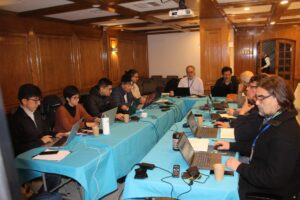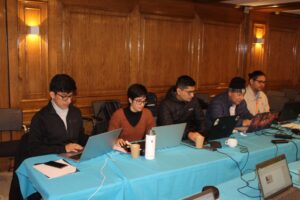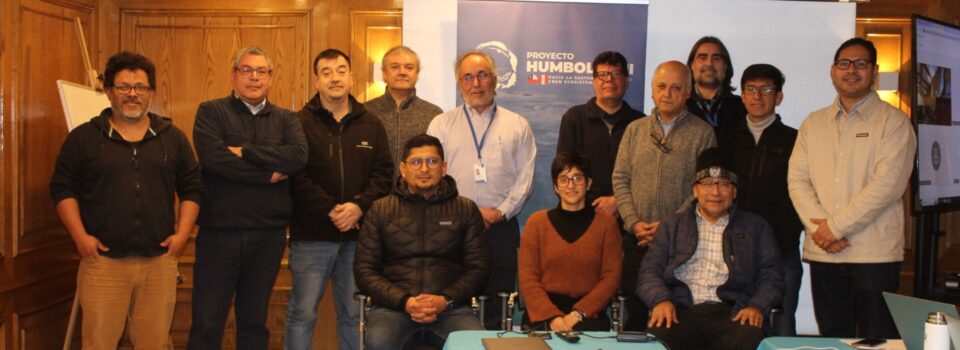Chilean and Peruvian researchers meet at the workshop “Standardization of the protocol for estimating the biomass of the southern Peru-northern Chile anchovy by hydroacoustic methods”
August 14th, 2024 At IFOP Valparaíso, from August 5 to 9, professionals from the Peruvian Sea Institute (IMARPE) and the Fisheries Development Institute (IFOP) held the workshop “Standardization of the protocol for estimating the biomass of the southern Peru-northern Chile anchovy by hydroacoustic methods” inserted in the GEF/UNDP/SUBPESCA/PRODUCE project “Catalyzing the Implementation of a Strategic Action Program for the Sustainable Management of Shared Living Marine Resources in the Humboldt Current System. GEF ID: #9592, known as the Humboldt II project.
At IFOP Valparaíso, from August 5 to 9, professionals from the Peruvian Sea Institute (IMARPE) and the Fisheries Development Institute (IFOP) held the workshop “Standardization of the protocol for estimating the biomass of the southern Peru-northern Chile anchovy by hydroacoustic methods” inserted in the GEF/UNDP/SUBPESCA/PRODUCE project “Catalyzing the Implementation of a Strategic Action Program for the Sustainable Management of Shared Living Marine Resources in the Humboldt Current System. GEF ID: #9592, known as the Humboldt II project.
The objective of the workshop was to agree on a standardized protocol that will serve as a guide for estimating biomass using hydroacoustic methods for the shared stock of anchovy in southern Peru and northern Chile.
Jorge Castillo, researcher and IFOP focal point, explained “this workshop is part of the objectives of the Direct Assessments GTB considered within the Scientific and Technical Subcommittee (SCCT) of the Humboldt II project that seeks to estimate the shared anchovy stock in southern Peru and northern Chile (SCA-SPNCH). The result of these measurements should be an input to the stock assessment models, so they are coordinated with the results of the other GTBs. Specifically, the workshop seeks to establish two standardized protocols.
For this purpose, the following factors were analyzed: cruise periods, acoustic equipment, echo sounder frequencies, data collection strategies, species recognition methods, and collection of biological data using fishing gear.
In addition, the methodologies for estimating anchovy abundance/biomass applied in each country were analyzed and comparative analyses were performed. For this purpose, each country provided and shared a set of data in order to apply the corresponding methodologies.”
The expected result of the Workshop was to have a protocol for collecting the data required for estimating biomass, hopefully standardized, and if not possible, to determine the conversion factors. A second expected result was to have a draft protocol for estimating biomass, standardized or with the necessary conversion factors to refer to the results and obtain the size of the shared stock. This draft protocol will be finalized during the year 2024.
Gonzalo Pereira Puchy, Executive Director of IFOP, said: “For IFOP, it is very gratifying to have hosted this workshop, which is part of the activities of the Humboldt II project, which we carry out jointly with the Peruvian Sea Institute. The workshop is part of one of the components of the project and has to do with one of the main fisheries in northern Chile and southern Peru, which is the anchovy. For us it has an additional importance, since this reactivates a long relationship of cooperation that IFOP and IMARPE have had in these 60 years of history”
 Dr. Pedro Castillo Valderrama, General Director of hydroacoustic research, remote advice and fishing gear of IMARPE-Peru referred to the workshop “I am very happy to meet friends and colleagues with whom we have worked several times. We are trying to standardize a methodology and apply it to resources that are common such as anchovy, which is of interest to our institutions, IMARPE and IFOP”.
Dr. Pedro Castillo Valderrama, General Director of hydroacoustic research, remote advice and fishing gear of IMARPE-Peru referred to the workshop “I am very happy to meet friends and colleagues with whom we have worked several times. We are trying to standardize a methodology and apply it to resources that are common such as anchovy, which is of interest to our institutions, IMARPE and IFOP”.
Dr. Daniel Grados Paredes, a direct evaluation researcher from IMARPE, said, “I am very pleased to be part of the binational workshop to develop standardized methodologies to evaluate anchovy, which is a shared resource. The workshop was very fruitful, as we are reaching agreements that will lead us to guarantee the sustainability of the resources shared between Peru and Chile. We are meeting with colleagues in person, with whom we are enriching and strengthening the ties between IMARPE and IFOP.”
Press related links:
